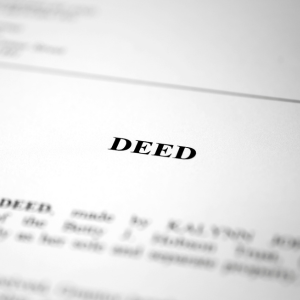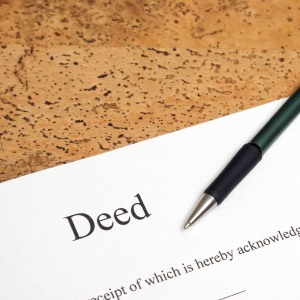
How to File a Quitclaim Deed in Massachusetts
It’s easy to file a quitclaim deed in Massachusetts, but you must pay close attention to the details. A quitclaim deed is a legal document used to give someone your land without considering any promises. It is used in many real estate deals, such as between family members or when a house is sold.

What Are the Steps to File a Quitclaim Deed?
Follow these steps to file a quitclaim deed in Massachusetts:
- Prepare the Quitclaim Deed: Obtain the correct Massachusetts legal requirements form. Include the grantor’s and grantee’s full names and a detailed property description.
- Complete the Form: Fill out the form accurately, including the consideration amount, even if it is minimal.
- Signatures: The grantor must sign the deed before a notary public.
- Record the Deed: Submit the completed deed to the Registry of Deeds in the property’s county and pay the filing fees.
Where Can You Obtain the Needed Forms?
You can get Massachusetts quitclaim deed forms from several sources:
- Registry of Deeds: Visit your local office to request forms.
- Online Resources: Download templates from legal document websites. Ensure they are valid for Massachusetts.
What Documentation Is Required for Filing?
To file a quitclaim deed in Massachusetts, you need:
- The Completed Quitclaim Deed Form: Properly filled and signed.
- Proof of Identity: Valid ID for the grantor during notarization.
- Recording Fees: Payment for filing at the Registry of Deeds.
How Much Does It Cost to File a Quitclaim Deed in Massachusetts?
The cost of filing a quitclaim deed includes:
- Filing Fees range from $75 to $125, depending on the county.
- Additional Costs: This may include notary fees and any legal assistance needed.
Are There Additional Fees Involved?
Additional fees may apply, such as:
- Notary Fees: Charged for the deed’s notarization.
- County-Specific Fees: Each county may have unique filing costs.
Can Costs Vary by County?
Yes, costs vary by county in Massachusetts. Contact the local Registry of Deeds to confirm current fees.
Can You File a Quitclaim Deed Online in Massachusetts?
Some counties in Massachusetts now offer online filing for quitclaim deeds.
What Are the Advantages of Online Filing?
Online filing offers several advantages:
- Convenience: Submit documents without needing to visit an office.
- Speed: Faster processing than traditional methods.
- Efficiency: Streamlines the process and reduces paperwork.
Is Online Assistance Available for Filing?
Many counties provide online support to guide you through filing. Digital resources help answer questions and ensure the completion of necessary steps.
What Are the Timeframes for Processing a Quitclaim Deed?
Processing times for a quitclaim deed in Massachusetts vary based on several factors.
How Long Does It Typically Take?
Depending on the county’s workload and submission method, processing typically takes a few days to several weeks.
Are There Ways to Expedite the Process?
To expedite the process, you can:
- Choose Online Filing: If available, this option can reduce waiting time.
- Check for Accuracy: Double-check all information before submission to avoid delays.
For more detailed guidance or personal assistance with filing a quitclaim deed, contact Naples Home Buyers, your trusted partner in Massachusetts real estate transactions.
Understanding the Legal Implications of a Quitclaim Deed
A quitclaim deed is a legal document used in Massachusetts and other states to transfer property ownership. It allows one party to transfer their interest to another without any warranty on the title’s quality. Knowing its implications helps in making informed decisions in real estate transactions.

What Rights Does a Quitclaim Deed Transfer?
Using a quitclaim deed transfers the rights the grantor currently holds in the property. It does not guarantee a clear title or that there are no encumbrances. This lack of assurance highlights the importance of knowing the property’s ownership status and any potential issues in real estate transactions.
How Does It Differ from Other Deeds?
Different types of property deeds include the warranty deed and special warranty deed. These differ from a quitclaim deed in that they provide guarantees. A warranty deed assures a clear title, while a special warranty deed ensures no claims arose during the grantor’s ownership. In contrast, a quitclaim deed offers no such assurances, which makes understanding these differences crucial for your transaction needs.
When Is This Type of Deed Commonly Used?
Quitclaim deeds are frequently employed in non-sale circumstances, including estate planning, divorce settlements, and family transfers. They enable rapid property transfers without necessitating a comprehensive examination of the property’s history, which is customary in formal real estate transactions.
Are There Risks Associated with Using a Quitclaim Deed?
Though quitclaim deeds offer simplicity, they come with risks. The absence of warranties means potential claims or disputes could arise concerning the property’s title. Understanding these risks is essential when using a quitclaim deed in real estate transactions.
Could Previous Owners Have Claims?
Without a title guarantee, previous owners might have claims if there are unresolved issues. A property’s history might reveal hidden encumbrances or liens, posing claim risks. Reviewing the property’s history is a crucial step to avoid future conflicts.
Who Ensures the Title Is Clear?
A title company plays a key role in ensuring the title is clear. They provide title insurance to protect against unforeseen disputes, giving legal assurance about the property’s legitimacy. Working with a respected title company can help protect your interests in the transaction.
Why Is Legal Advice Important When Filing a Quitclaim Deed?
When submitting a quitclaim deed, it is essential to retain the services of an attorney due to the complexity involved. Legal counsel can help you avoid making mistakes and provide clarity, efficiently leading you through property law.
What Can Go Wrong Without Proper Guidance?
If you don’t have the right information, you could make legal mistakes like filing incorrectly, which could cause you to lose property or make mistakes in a deal. Having correct paperwork that follows Massachusetts property rules is very important to avoid these issues.
How Do Attorneys Assist in the Process?
Attorneys are essential to the quitclaim deed process by undertaking due diligence and preparing documents. Their proficiency in real estate law ensures that all legal formalities are addressed, providing a sense of security throughout the transaction. By enlisting the assistance of seasoned real estate attorneys, you can expedite the process and safeguard your interests.
Preparing Your Quitclaim Deed Correctly
What Information Must Be Included in the Deed Form?

To sell a house with a quitclaim deed, you’ll need to use a quitclaim deed form, which transfers property ownership without warranty. The form must include key details such as the grantor’s and grantee’s names, an accurate property description, and clear title information. Ensuring these elements are correct is crucial to avoid potential legal issues.
How Should Each Section Be Filled Out?
When filling out a quitclaim deed, pay close attention to every section. Start with the grantor’s and grantee’s names, confirming the correct spelling. The property description should match official records precisely. Complete all documentation requirements and check for accuracy. Errors here can lead to legal problems later.
Are There Common Errors to Avoid?
Even though they are easy to understand, quitclaim papers can have mistakes. Names that are written wrong, property descriptions that aren’t clear, and signatures that are missing are all common problems. Make sure the information matches the legal property records. If there are any differences, the deed may not be valid.
How Important Is Notarization for a Quitclaim Deed?
A notary public must notarize a quitclaim agreement. It proves that the people signing are who they say they are and agree to the rules. A property might not be legal if it is not notarized, and it could be contested in court.
Where Can You Find a Notary Public in Massachusetts?
This type of person can be found in Massachusetts at banks, courthouses, and shipping shops. Make sure there is a notary public close by who can process your quitclaim deed on time.
What Happens if a Deed Isn’t Notarized Properly?
A deed can get you into trouble if it isn’t signed correctly. If a deed is not notarized properly, it might not be recognized legally. This could affect its legal standing and cause problems in transactions or claims of ownership.
How Should You Handle Shared Property Ownership in Quitclaim Deeds?
All parties, or co-owners, must agree to the deed’s provisions when dealing with shared ownership. Starting with a common agreement might make the process go more smoothly.
Do All Co-Owners Need to Sign the Document?
Yes, all co-owners must sign the quitclaim deed. Their signatures confirm their consent to the terms and conditions. Failing to get all necessary signatures can invalidate the document.
How Does Joint Ownership Affect the Deed?
When you have joint ownership in a quitclaim deed, your property rights are changed in certain ways. Each owner has an equal stake, affecting how the property can be sold or given away. To manage shared property ownership well, you need to understand these factors.
For professional assistance and expert advice on preparing your quitclaim deed, consider contacting Naples Home Buyers. Our experienced team is ready to guide you through every step of the legal process.
Recording and Storing Your Quitclaim Deed
Where Do You Record a Quitclaim Deed in Massachusetts?

In Massachusetts, recording a quitclaim deed is vital for transferring property ownership. You must submit the document to the Registry of Deeds in the county where the property is situated. Begin this process by checking that all information on the quitclaim deed is correct and complete. Using a checklist can ensure everything is ready before filing.
What Is the Role of the Registry of Deeds?
The Registry of Deeds is central to the title transfer for quitclaim deeds in Massachusetts. This office keeps public records of real estate transactions. When your document is recorded, it receives a unique book and page number as part of the official record. Knowing the legal steps of a quitclaim deed can help you comply with Massachusetts property transfer laws.
Are There Specific Offices for Different Regions?
Yes, Massachusetts has offices in different areas that handle real estate deals. Each office has its own rules that apply to its county. It is important to find the right neighborhood registry office to follow these rules. This ensures that the Massachusetts deed transfer goes quickly and that there are no delays caused by sending paperwork to the wrong place.
How Should You Store Your Recorded Quitclaim Deed?
After recording your quitclaim deed, keeping it secure is key. Protect the recorded deed for future reference and legal safety. Ensure Massachusetts deed forms and documents are stored to prevent loss or damage.
Why Is Safe Storage Crucial?
Safe deed storage protects your property rights and serves as proof of ownership. Maintaining the document’s integrity over time is essential for confirming the title transfer and supporting legal claims. A compromised deed could lead to disputes or ownership challenges.
Are Digital Copies Acceptable?
While digital copies of a Massachusetts quitclaim deed can be useful backups, they do not replace the original document. Electronic record-keeping is convenient, but verify that digital versions meet state requirements for property title transfers. Always store the physical copy securely.
What Are Your Next Steps After Recording the Deed?
Once your deed is recorded, several actions are required to complete the Massachusetts property title transfer. Check that all details are correct and meet legal standards.
Should You Inform Any Other Parties?
Yes, it is necessary to inform relevant parties about the property transfer. Notify mortgage lenders, insurance companies, and other stakeholders to address any legal implications of the transfer.
How Do You Verify that the Deed Is Properly Recorded?
Verification is crucial to ensure the deed’s proper recording. Access the Massachusetts land record system to confirm your quitclaim deed is officially documented. If issues arise, contact the Registry for assistance in resolving them.
FAQs:
What is a Quit Claim Deed, and how does it differ from a warranty deed in Massachusetts?
A Quit Claim Deed transfers property ownership without guaranteeing the title’s condition. In contrast, a warranty deed assures that the title is free from liens and encumbrances. Both are used in Massachusetts real estate transactions, but they provide different levels of protection to the grantee.
How can I file a Quit Claim Deed in Massachusetts, and what are the requirements?
To file a Quit Claim Deed in Massachusetts, complete the deed form with accurate details about the property and involved parties. The document must be notarized and filed with the county registry of deeds, along with the required filing fee. Ensure compliance with Massachusetts state laws for proper recording.
Are there any specific guidelines for notarizing a Quit Claim Deed in Massachusetts?
Yes, a notary public must witness the grantor’s signature on the Quit Claim Deed in Massachusetts. They will verify the signer’s identity and ensure the document complies with Massachusetts notary standards.
What fees are involved when transferring property ownership through a Quit Claim Deed in Massachusetts?
Transferring property with a Quit Claim Deed involves paying deed transfer fees, which vary by county. Additional costs may include notary fees and taxes, depending on local regulations and the property’s value.
Can a Quit Claim Deed in Massachusetts affect my property taxes?
Transferring property through a Quit Claim Deed might impact taxes, especially if there is a significant change in ownership or property value. Consult a tax professional to understand any potential tax implications of the transaction.
Who typically uses a Quit Claim Deed in Massachusetts real estate transactions?
Quit Claim Deeds are often used among family members, during divorce settlements, or to resolve title issues without guaranteeing a clear title. They are suitable when trust exists between the involved parties due to the absence of title guarantees.
What should be included in a Massachusetts Quit Claim Deed form before submission?
The form should include the full legal description of the property, the names and addresses of the grantor and grantee, and a clear statement of intent to transfer ownership. Before notarizing and submitting it, ensure it meets Massachusetts state law requirements.
Are witnesses required when signing a Quit Claim Deed in Massachusetts?
Massachusetts does not require witnesses to sign a Quit Claim Deed, but the document must be notarized. Confirm local county requirements, as they may differ slightly across the state.
Key Insights
- Understanding state laws and document requirements is critical to filing a quitclaim deed in Massachusetts and a successful property title transfer.
- We offer guidance on obtaining and completing the Massachusetts quit claim deed form accurately to avoid legal issues during the property conveyance process.
- Our services include notarizing the quitclaim deed in Massachusetts and ensuring compliance with statutory requirements for document validity.
- Learn about Massachusetts deed transfer fees, which can affect the overall cost of transferring property ownership.
- Understand the Massachusetts quitclaim deed procedure, including the necessity for witnesses, and address title assurances and warranties concerns.
- Find out how warranty deeds differ from quitclaim deeds and determine which type suits your property transfer needs in Massachusetts.
- We provide insights into special considerations such as easements, HOA agreements, and joint ownership to help you manage the complexities of real estate transfers.
- Gain clarity on quitclaim deed tax implications and recording requirements to ensure a smooth transaction process.
These details apply to the entire state of Massachusetts, including cities like Springfield, Amherst, Greenfield, Huntington, and Hadley, as well as their surrounding areas. If you require extra assistance or have particular inquiries, please contact us at (413) 331-6060. Please see our website, Naples Home Buyers, for more information and complete descriptions of our services.
Sell Your House in Massachusetts For Cash 💰
We buy houses in Massachusetts In ANY CONDITION! We pay CASH and you will not pay any commissions, agents, or fees. Enter your address to get your cash offer in 24 hours or less!
Resources To Help You Sell A House in Massachusetts
Give Us A Call At (413) 331-6060
If you require additional assistance or have specific questions, please do not hesitate to Contact Us at (413) 331-6060. You Can also visit our Homepage at Naples Home Buyers for more information and detailed descriptions of our services.


